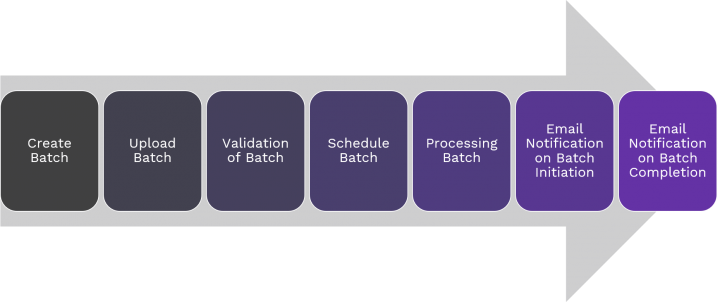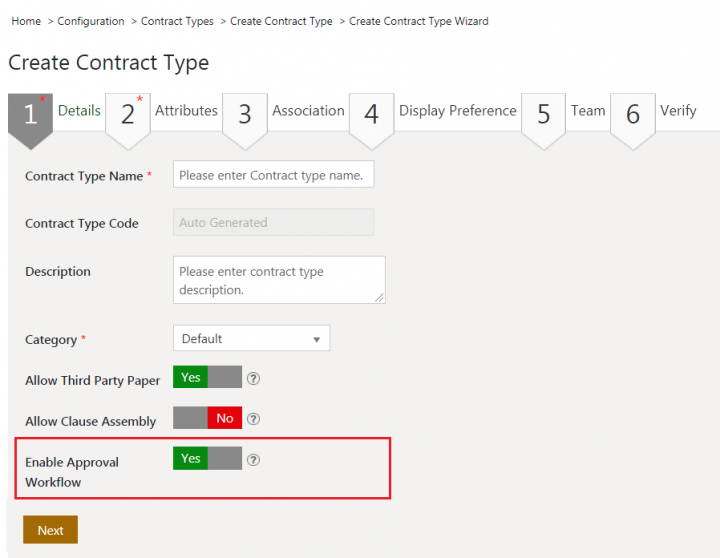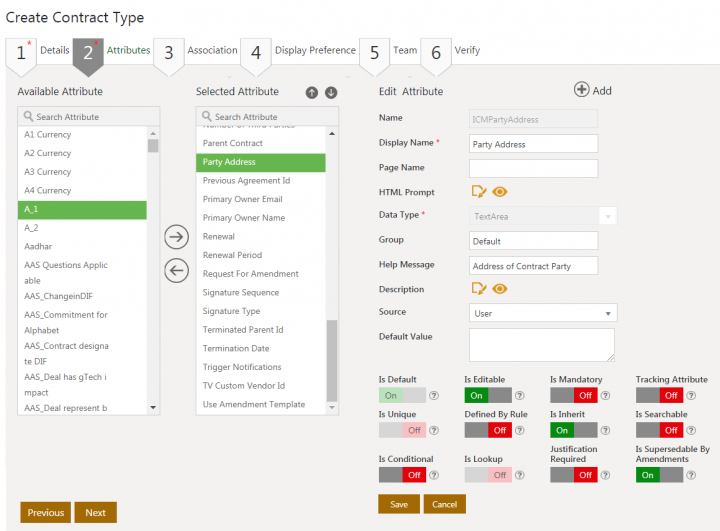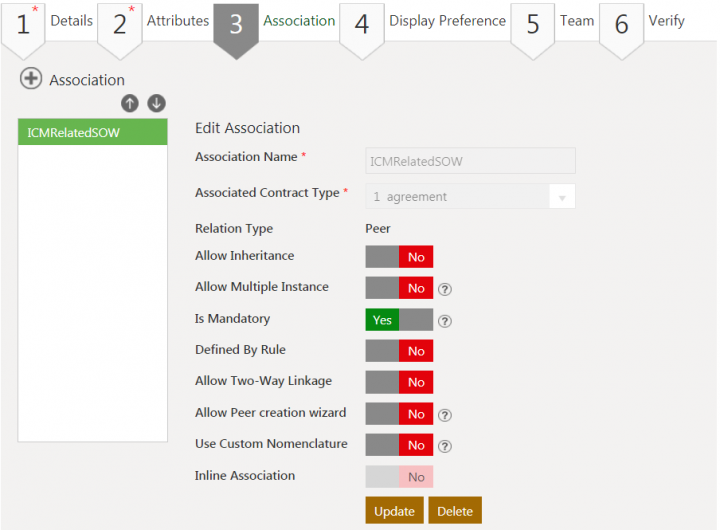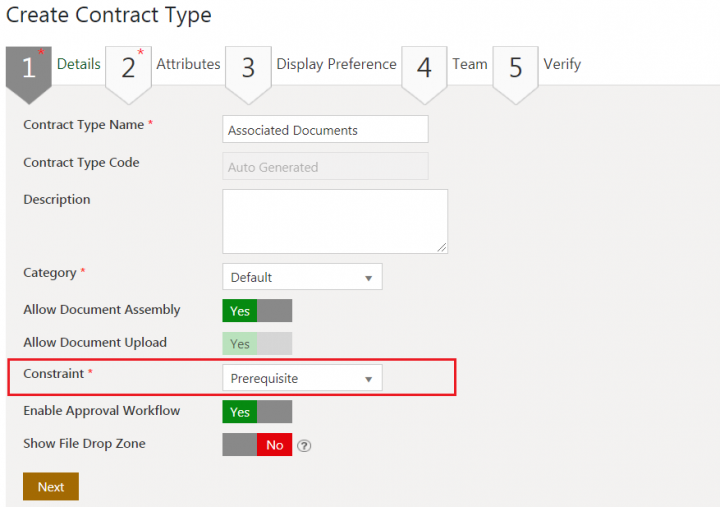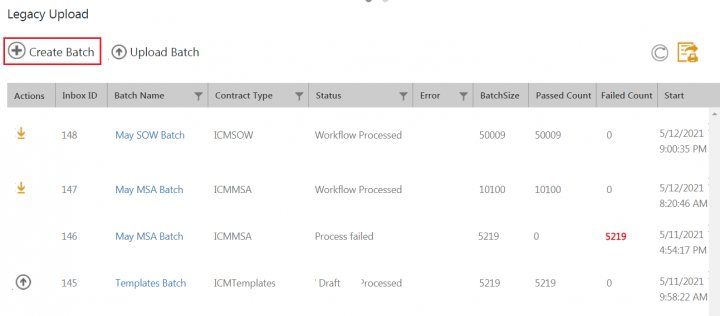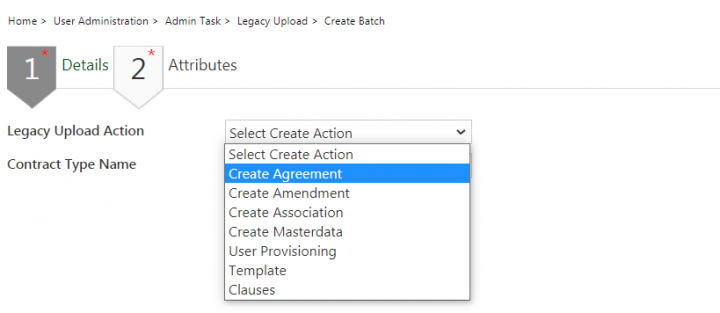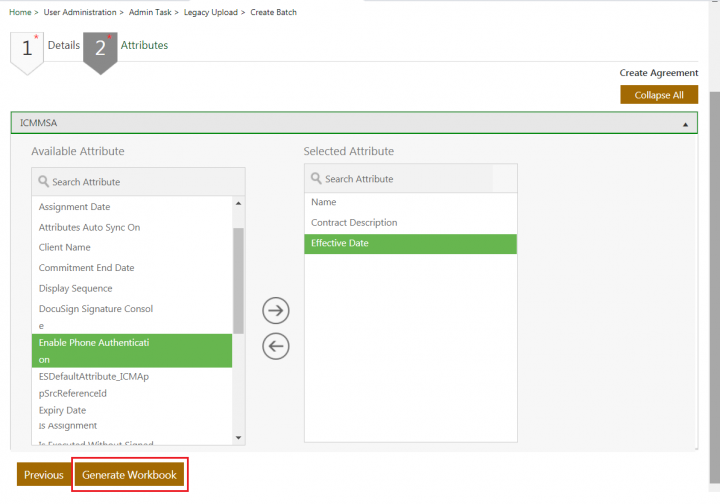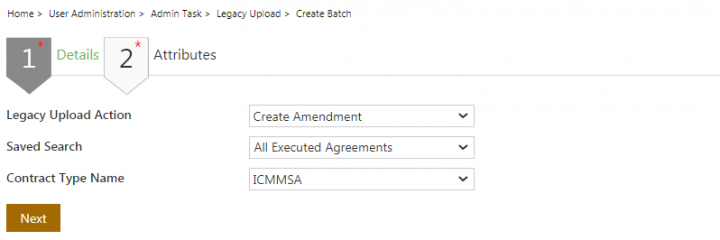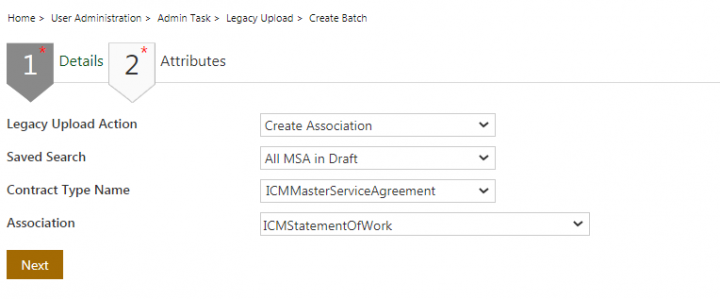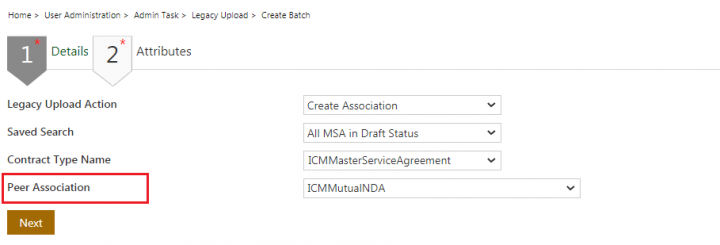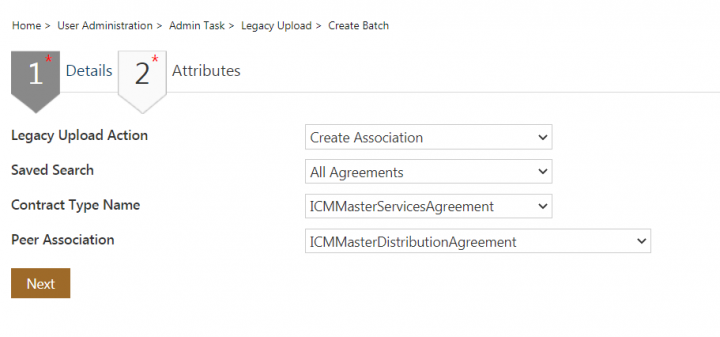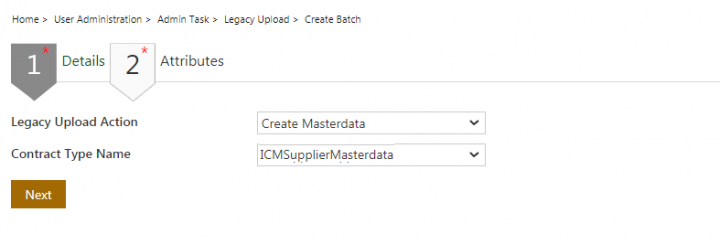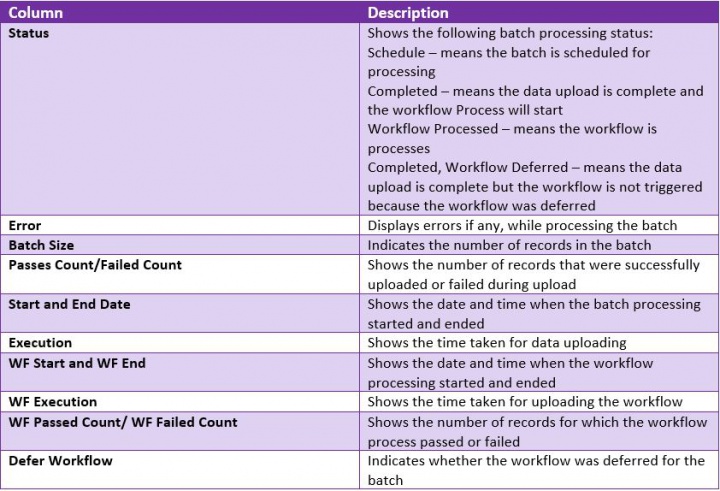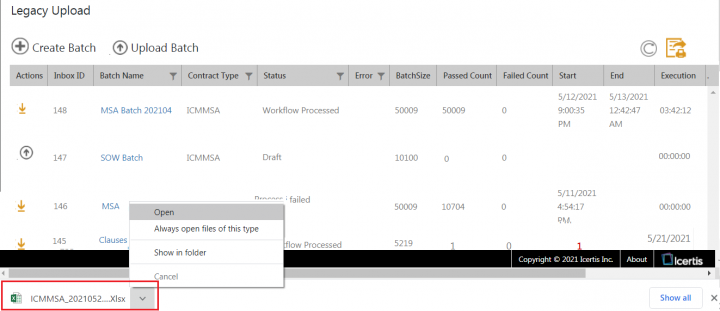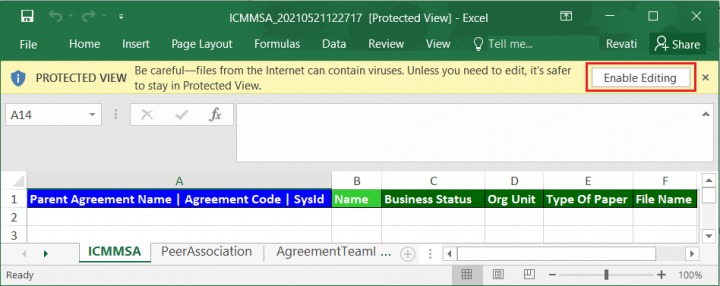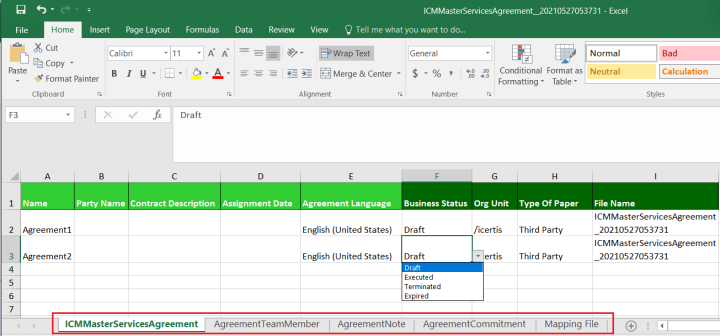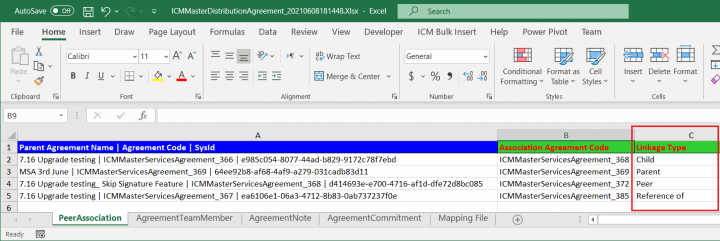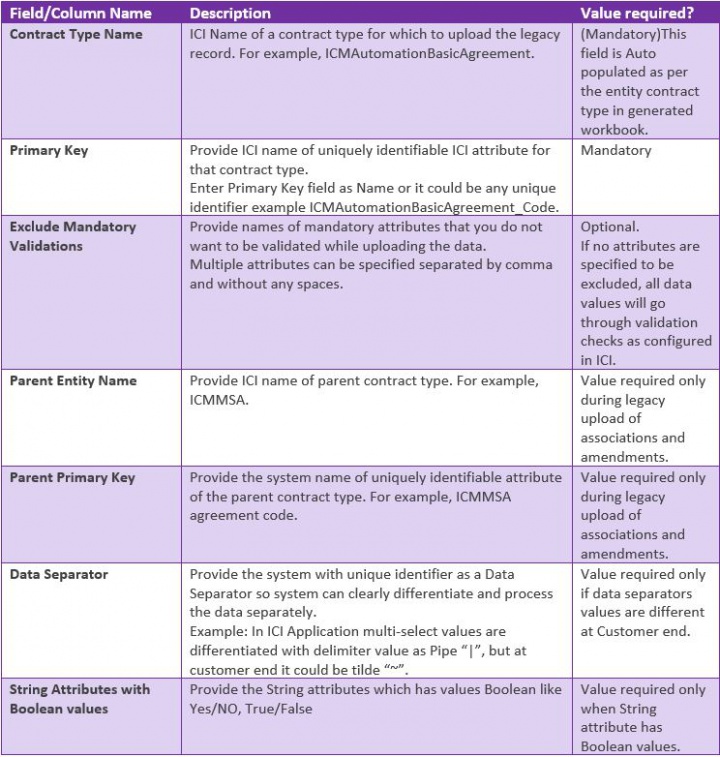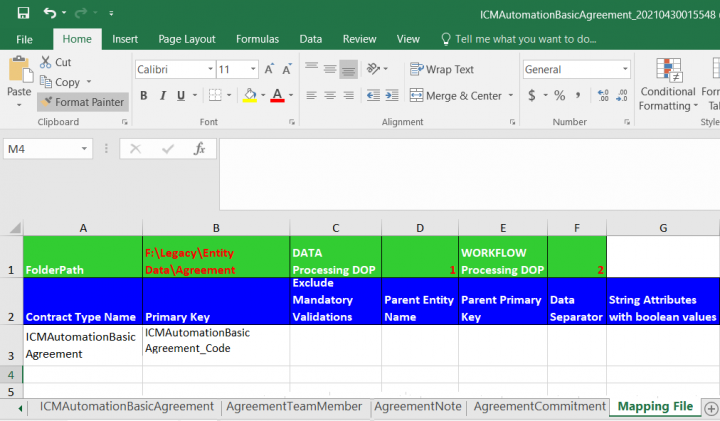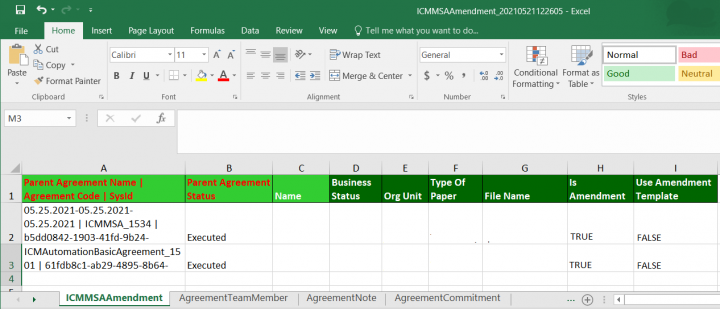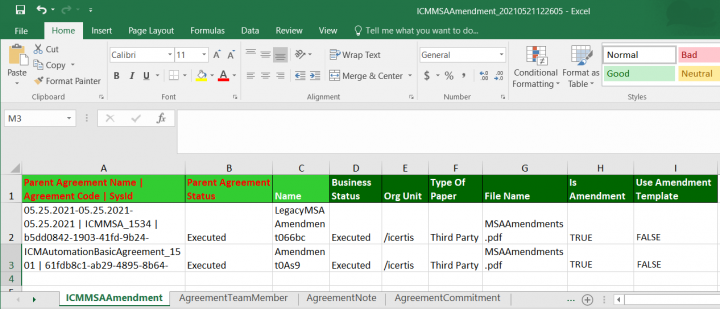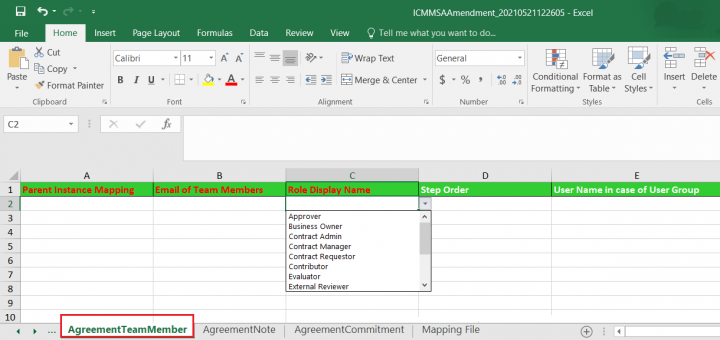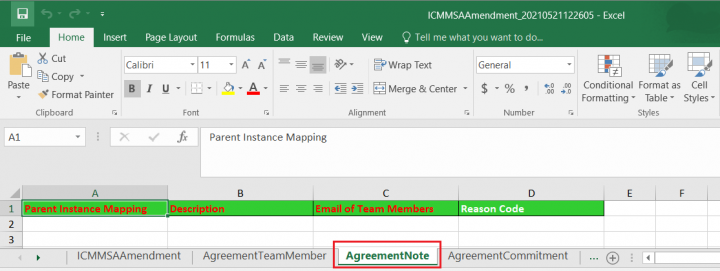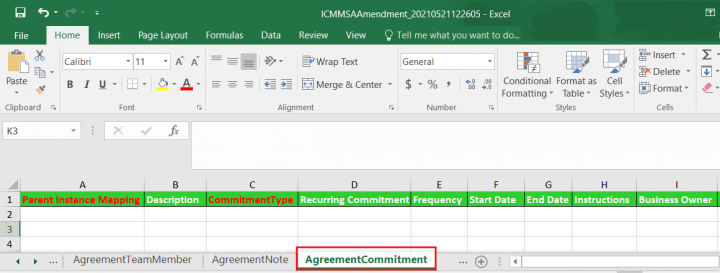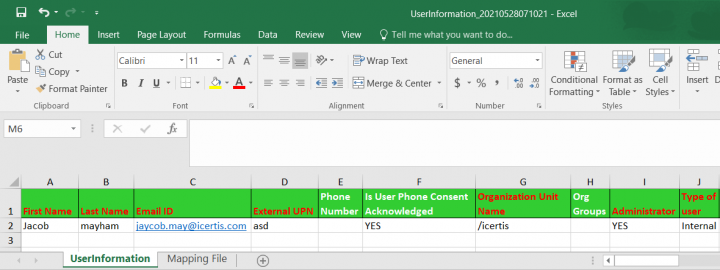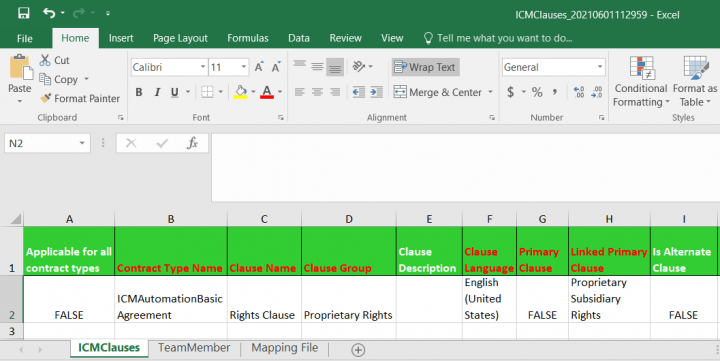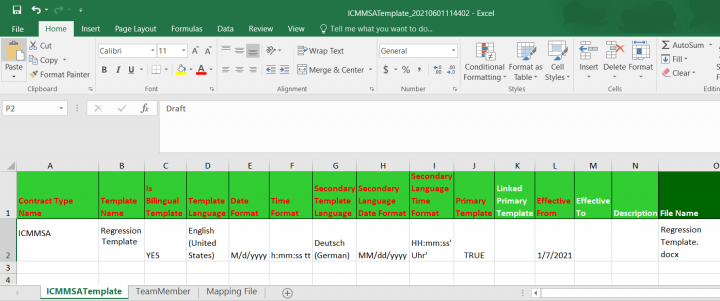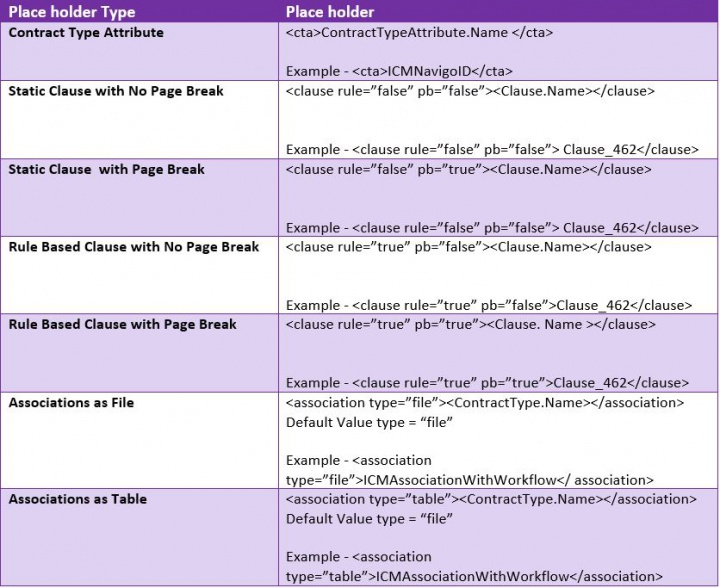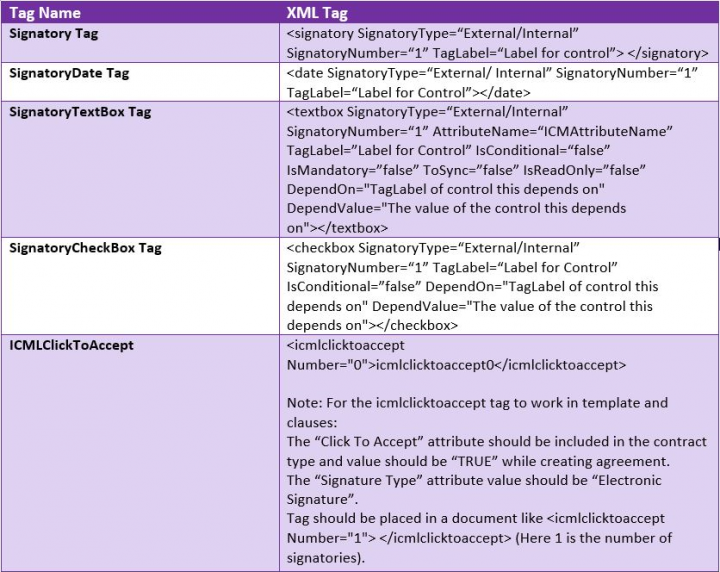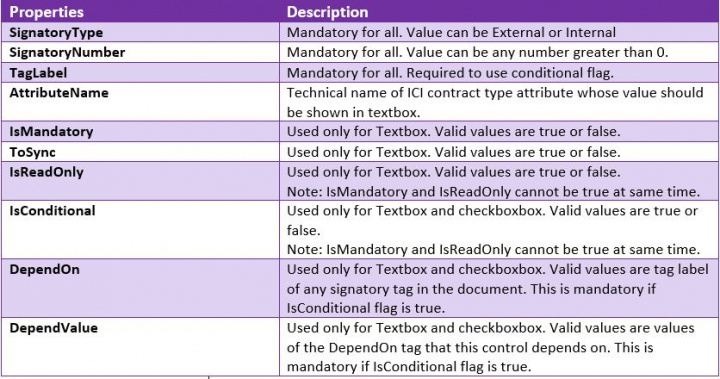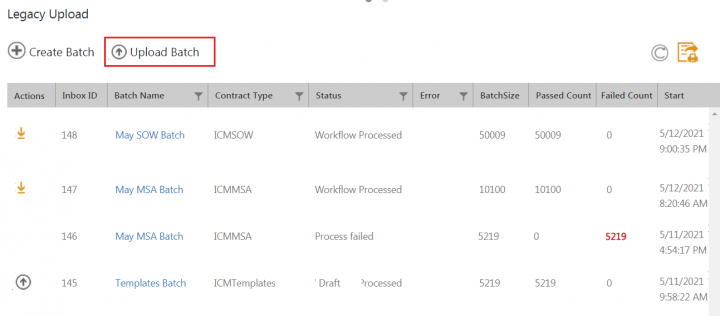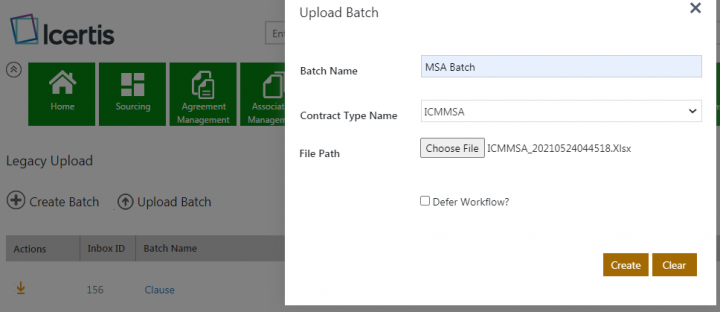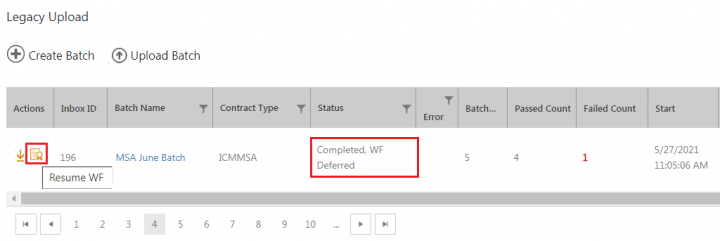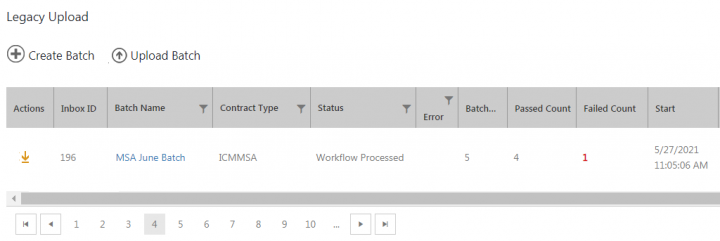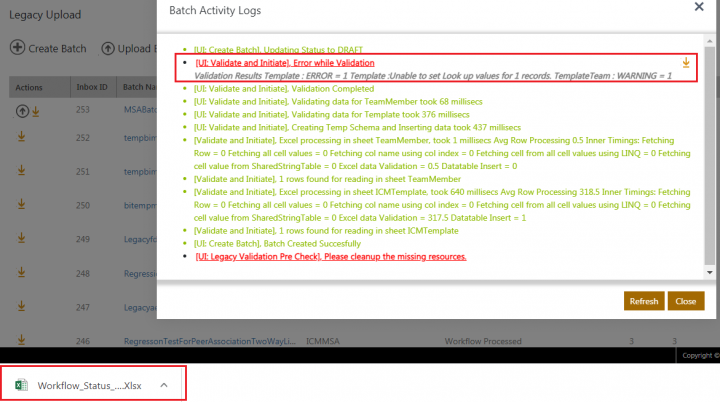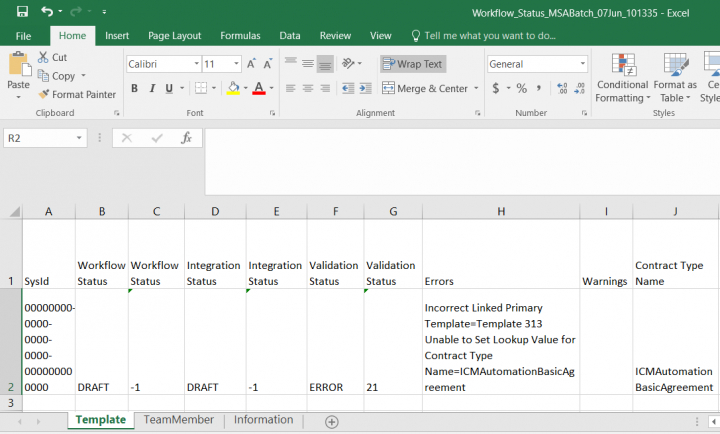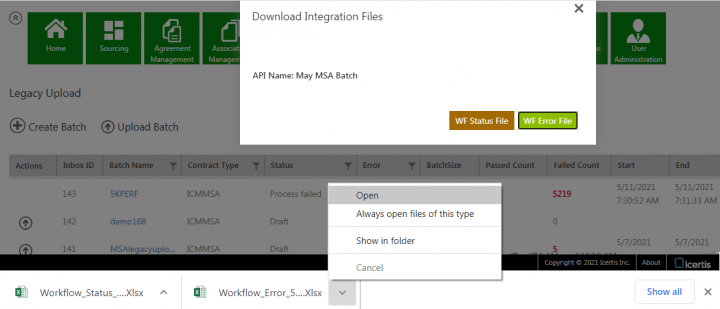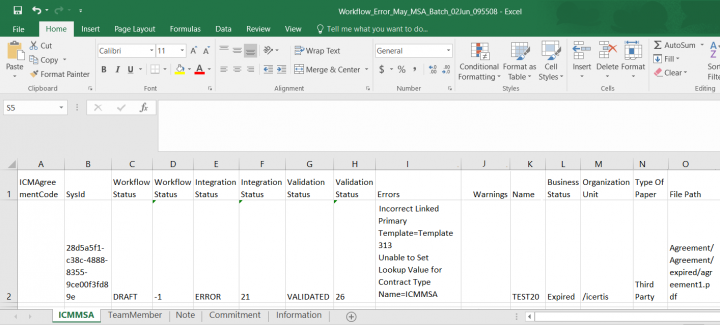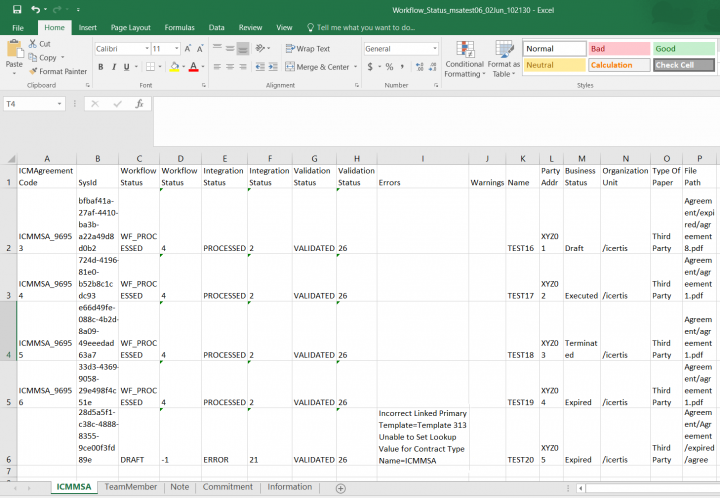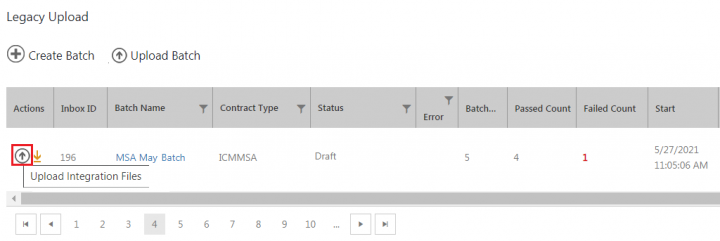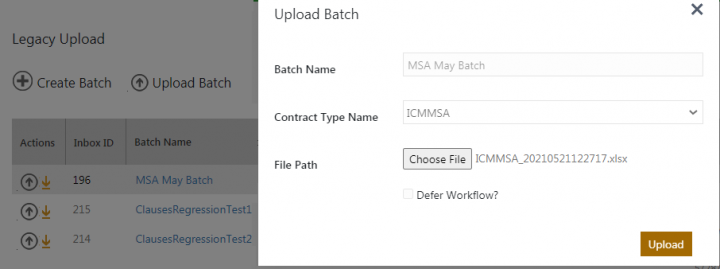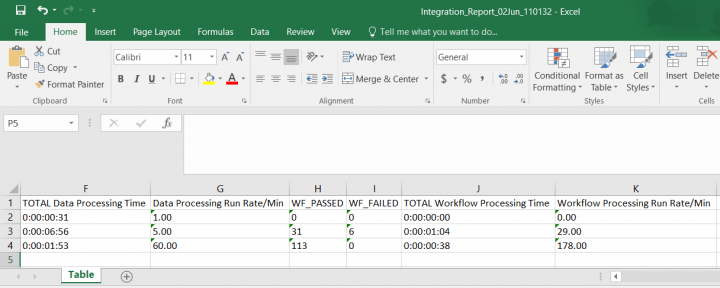Shefali DK (Talk | contribs) |
|||
| Line 61: | Line 61: | ||
If the contract type does not exist in ICI, you must create the contract type for the entity of legacy records. You must configure the details of legacy records as the attributes in ICI contract type. | If the contract type does not exist in ICI, you must create the contract type for the entity of legacy records. You must configure the details of legacy records as the attributes in ICI contract type. | ||
| + | |||
==== Configuring contract type with or without approval workflow ==== | ==== Configuring contract type with or without approval workflow ==== | ||
Revision as of 20:14, 14 December 2021
Contents
- 1 Legacy Upload
- 1.1 Important Considerations
- 1.2 Uploading entities using Legacy Upload
- 1.3 Creating a batch for an entity
- 1.4 Accessing Legacy Upload Page
- 1.5 Preparing the workbook with legacy records data
- 1.5.1 Accessing the Workbook
- 1.5.2 Specifications of a workbook
- 1.5.3 Preparing the Mapping Sheet
- 1.5.4 Preparing the data sheet for ICI entities
- 1.6 Uploading the batch
- 1.7 Viewing the batch Activity Log
- 1.8 Checking Integration Files
- 1.9 Re-uploading of a batch
- 1.10 Accessing Integrated batches report
- 1.11 Accessing Notifications
- 1.12 Accessing the uploaded entities in the ICI
Legacy Upload
Organizations may have a large number of existing Agreements that are created outside of ICI platform. These are henceforth referred to as Legacy Agreements. Organizations may want to import these Agreements to ICI to leverage its vast capabilities and manage all Agreements within a single platform.
ICI legacy Migration tool helps in migrating these large volumes of legacy Contracts from the Customer system to ICI Application with accuracy and efficiency which helps in creating a central repository. This in turn helps in a shift from Paper base to digitalization.
The highlights of the ICI Legacy Migration Tool are:
- Uploading entities such as Agreements and their respective Teams, Notes, and Commitments in bulk.
- Uploading Associations, Masterdata, User Information and Amendments in bulk.
- Bulk Clause and Template creation, with the power of Attribute/metadata tagging.
- Enhanced validations, including the ability to exclude the specified attributes from being validated.
- Ability to view logs and report of success and failure statuses on legacy UI.
- Record level email notification trigger capability as per customer requirement.
- Reporting capabilities on the uploaded legacy records.
- Email Notifications for batch initiation and completion.
- Support of Peer Association & Linkage types, ensuring no manual work post legacy upload.
- Enabling legacy upload of Agreements with Status as Expired, Terminated.
- Support uploading of files from Sub folder from Task server and blob storage repository.
Important Considerations
- Only an Administrator can perform a Legacy Upload of the entities.
- The absolute path where the Agreements and other entities documents are saved must be accessible by the task service of the ICI instance. This must be ensured while configuring the ICI instance.
- The Data files created in Excel can only have .xlsx extension.
- For Agreements, only .pdf files are supported. For Associations, several file formats such as .pdf, .docx, .doc, .xlsx, .jpeg, .png and .zip are supported.
- Contract types for the Agreements and other entities that you are trying to upload must be present in Published state in ICI.
- To upload any Associations, ensure that the relevant contract type has been added in the Associations tab in the parent contract type.
- An attribute which will always have unique value must be present in ICI so that the relevant value can be used as a Primary Key to map other entities with that Agreement. If such an attribute does not already exist, you must create it. The unique value attribute can be a backend attribute which may not be visible on the UI. However, Agreement Code attribute, though unique, contains a system-generated value that is generated only after an Agreement has been created thus, cannot be used as a Primary Key for the contract type.
- When adding batches for uploading, it is advisable not to schedule too many batches at close intervals and configure schedules to line-up batches to be uploaded at different times to optimize the processing speed.
- Since this is only a provisioning tool, as such any sort of updates to uploaded records are not supported.
Uploading entities using Legacy Upload
You can use the utility to upload the following entities:
- Agreements with Team, Notes, and Commitment
- Amendments with Team, Notes, and Commitment
- Associated Documents (with or without workflow)
- Masterdata (with or without workflow)
- User Information (with or without Extended Attributes)
- Clauses (with or without Extended Attributes)
- Templates (with or without Extended Attributes)
The Legacy Upload tool follows a simple workflow to upload the aforementioned entities.
The workflow for Legacy Upload process at a glance:
Creating a contract type entity for Legacy Upload
To upload legacy records in ICI, there must be a relevant contract type configured in the ICI as per the specific entity type need of legacy records.
If the contract type does not exist in ICI, you must create the contract type for the entity of legacy records. You must configure the details of legacy records as the attributes in ICI contract type.
Configuring contract type with or without approval workflow
You can upload entities such as Associations, Masterdata with or without Approval Workflow using Legacy Upload.
You can automatically attach the Approval workflow to an entity while processing the Legacy Upload batch. All you have to do is enable the approval workflow in the contract type by setting the Enable Approval Workflow attribute value to Yes.
For entities that have the Enable Approval Workflow attribute value set to No in their contract type, the approval workflow will not follow automatically. You can enable the workflow manually, whenever needed, by clicking the Resume WF icon.
When an Entity that has been uploaded without workflow is viewed in ICI, it will not have any buttons visible on the UI.
To create a contract type:
- Click Configuration > Create Contract Type on the Home page. The Create Contract Type page opens.
- Select the Contract Type of the entity for which you want to upload legacy records. For example, AGREEMENT Contract Type.
- Click Next. The Details tab opens.
- Enter the Contract Type Name and other required details.
- Toggle the “Enable Approval Workflow “ to Yes if you want to enable the workflow for approval for this contract type with the creation.
- Click Next. The Attributes tab opens.
- Select and add the Attributes which are required for the legacy records you are uploading, to map them to the ICI Contract Type.
- Click Next and enter the details on the Associations, Display Preference and Team tabs to complete the contract type creation following the standard ICI workflow.
Refer the Creating Contract Type for further details on how to configure contract types.
Configuring contract type with mandatory Associations
There may be cases where any associated documents are required before an Agreement can move to the Executed, Expired or Terminated state. In that case, you can defer the workflow for the Agreement while uploading, then upload the required Association with workflow attached, and then enable the workflow for the Agreement when needed.
Whether an Association is mandatory or not can be seen in ICI in the following 2 ways:
If Is Mandatory flag is set to Yes while adding an Association for a particular Agreement Contract Type, an Association is mandatory.
If Prerequisite or Post requisite is selected in the Constraints drop-down list while creating an Associated Document Contract Type, an Association is mandatory.
Creating a batch for an entity
Once the relevant contract type is present in the ICI, you can create a new batch to upload the legacy records in the ICI from the Legacy Upload page.
Creating a batch for agreements
- Click the User Administration tile on the Home page. The sub menu tiles dropdown opens.
- Click the Admin Task tile. The Admin Task page opens.
- Click the Legacy Upload option. The Legacy Upload page opens.
- Click the Create Batch icon. The Create Batch page’s Details tab opens.
- Identify the entity for legacy records and select the Legacy Upload Action accordingly from the dropdown. For example, select Create Agreement when you are creating a batch of agreements.
- Select the Contract Type Name. The dropdown will show all agreement contract types configured in ICI. For example, ICMMSA.
- Click Next. The Attributes tab opens. The Available Attribute section shows all attributes from the selected agreement contract type in the left column. The mandatory attributes like Name is already populated in the Selected Attribute list.
- Select the attributes for which you want to upload the legacy data in the current batch from the Available Attribute section and add to the Selected Attribute section using the action arrows. For example, select attributes Name, Contract Description and Effective Date.
- Click Generate Workbook. The workbook template is generated in the MS Excel format and downloaded at the pre-set download location on your system.
Creating a batch for Amendments
The agreement contract type for uploading Amendments is already available in the ICI when the parent agreements were created or unloaded. You can create a set of agreements that you want to upload amendments to, using the Saved Search capability.
To create an amendment batch:
- Click User Administration > Admin Task on the Home page. The Admin Task page opens.
- Click the Legacy Upload option. The Legacy Upload page opens.
- Click the Create Batch icon. The Create Batch page’s Details tab opens.
- Select the Legacy Upload Action from the dropdown. For example, Create Amendment. The fields to select Saved Search and Contract Type name are displayed.
- Select a Saved Search. For example, All Executed Agreements.
You must create a saved search beforehand to group the agreement records to which you want to add the amendments through Legacy Upload. For example, here, configure the Saved Search for all Executed Agreements. The system would ignore all statuses other than Executed.
- Select the Contract Type Name. The dropdown will show all agreement contract types from the selected Saved Search. For example, select ICMMSA.
- Click Next and complete the batch creation for Amendments following the same process as for the creation of the agreement batch.
Creating a batch for Associations
Before you proceed to upload Associations using the Legacy Upload, ensure that the parent Agreements are already uploaded. Also ensure that the Associated Document Contract Type has been added in the Associations tab in the parent Agreement Contract Type.
You can upload Associations with or without Approval Workflow using Legacy Upload in the ICI.
Associations can be mapped with their parent agreements using a Saved Search capability. A set of agreements can be created for which you want to upload peer associations by configuring a Saved Search beforehand. The auto-generated workbook will contain the agreements details from the selected saved search as the parent agreements. These details would help users to find the records in the ICI and map them with the Association agreement code in the workbook.
To create an Association batch:
- Click User Administration > Admin Task on the Home page. The Admin Task page opens.
- Click the Legacy Upload option. The Legacy Upload page opens.
- Click the Create Batch icon. The Create Batch page’s Details tab opens.
- Select the Legacy Upload Action from the dropdown. For example, Create Association. The fields to select a Saved Search and parent Contract Type are displayed.
- Select a Saved Search to pick a set of parent agreements. For example, All MSA Draft Status.
- Select the Contract Type Name for which you want to upload the legacy associations. This dropdown field displays the contract types from the selected Saved Search. For example, select ICMMasterServicesAgreement.
The Association field is displayed to select the associated document contract type for the legacy associations you are uploading in this batch.
This dropdown field displays all Associated Document Contract Types configured under the Association tab for the Contract Type that you have selected in the Contract Type Name field.
- Select the Association contract type. For example, ICMStatementOfWork.
- Click Next and complete the batch creation for Association following the same process as for creation of agreement batch.
The auto generated workbook will contain the pre-filled details for the selected agreement contract type from the selected saved search as parent agreements.
Creating a batch for Peer Associations
You can upload associated documents as peer associations to agreements using Legacy Upload.
- Follow the same process explained in the section above for creating a batch for Associations till the selection of Associated Document Contract Type on the Details tab of the Create Batch page.
- Select the Association contract type. For example, ICMMutualNDA.
When you select the peer Associated Document Contract Type in the Association field, the Association field will reflect this relationship for the selected parent Contract Type and Associated Document Contract Type combination.
- Click Generate Workbook. The workbook is auto generated with the pre-filled details of parent records for the selected contract type from the selected saved search in the “Parent Agreement Name | Agreement Code | SysId” format.
The workbook for peer associations also contains the Linkage Type column with the values as Parent, Child, and Peer. When there is the Linkage Type Masterdata configured in the ICI, the Linkage Type column will reflect the values from that masterdata.
Creating a batch for Peer Associations with Create wizard flow.
You can create associated documents as peer associations to agreements using Legacy Upload.
- Follow the same process explained in the section above for creating a batch for Associations till the selection of Associated Document Contract Type on the Details tab of the Create Batch page.
- Select the Association contract type. For example, ICMMasterServicesAgreement.
When you select the peer Associated Document Contract Type in the Association field, the Association field will reflect this relationship for the selected parent Contract Type and Associated Document Contract Type combination.
- Click Generate Workbook. The workbook is auto generated with the pre-filled details of parent records for the selected contract type from the selected saved search in the “Parent Agreement Name | Agreement Code | SysId” format, along with the Peer Association attributes as system would create Peer association like agreement creation and it would get linked to the Parent Agreement.
The workbook for peer associations also contains the Linkage Type column with the values as Parent, Child, and Peer. When there is the Linkage Type Masterdata configured in the ICI, the Linkage Type column will reflect the values from that masterdata.
Creating a batch for Masterdata
You can upload Masterdata with or without Approval Workflow using Legacy Upload.
To create batch for masterdata:
- Click User Administration > Admin Task on the Home page. The Admin Task page opens.
- Click the Legacy Upload option. The Legacy Upload page opens.
- Click the Create Batch icon. The Create Batch page’s Details tab opens.
- Select the Legacy Upload Action from the dropdown. For example, Create Masterdata. The fields to select Saved Search and Contract Type name are displayed.
- Select the masterdata in the Contract Type Name field. The dropdown will show all masterdata contract types configured in ICI. For example, select ICMSupplierMasterdata.
- Click Next and complete the batch creation for Masterdata following the same process as for creation of agreement batch.
Creating a batch for User information
You can provision the users in ICI using the Legacy Upload utility. User information is uploaded independently as it is not related to any other entities.
To create a User Provisioning batch:
- Click User Administration > Admin Task on the Home page. The Admin Task page opens.
- Click the Legacy Upload option. The Legacy Upload page opens.
- Click the Create Batch icon. The Create Batch page’s Details tab opens.
- Select the Legacy Upload Action from the dropdown. For example, User Provisioning.
When the Extended User Entity masterdata is configured in the system, the Next button is displayed to select the attributes from the extended masterdata, else the Generate Workbook button is displayed.
- Click Next. The Attributes tab opens.
The Available Attribute section displays all attributes from the Extended User Entity masterdata contract type.
- Select the attributes for which you want to upload the legacy data in the current batch from the Available Attribute section and add to the Selected Attribute section using the action arrows.
- Click Generate Workbook. The workbook template is generated in the MS Excel format and downloaded at the pre-set download location on your system.
Creating a batch for Clauses
You can import bulk clauses into ICI with the help of Legacy Upload Tool. User can migrate their existing clause repository from their previous system with lot of easy, along with it the tool also supports attributes tagging capability. An XML specification document is also released which can be used for creating tags in the input document files of Clauses.
To create Clauses batch:
- Click User Administration > Admin Task on the Home page. The Admin Task page opens.
- Click the Legacy Upload option. The Legacy Upload page opens.
- Click the Create Batch icon. The Create Batch page’s Details tab opens.
- Select the Legacy Upload Action from the dropdown. For example, Clauses.
When the Extended Clause Entity masterdata is configured in the system, the Next button is displayed to select the Clause Additional Attributes from the extended masterdata, else the Generate Workbook button is displayed.
- Click Next. The Attributes tab opens.
The Available Attribute section displays all attributes from the Extended Clause Entity.
- Select the attributes for which you want to upload the legacy data in the current batch from the Available Attribute section and add to the Selected Attribute section using the action arrows.
- Click Generate Workbook. The workbook template is generated in the MS Excel format and downloaded at the pre-set download location on your system.
Creating a batch for Template
You can import bulk Templates into ICI with the help of Legacy Upload Tool. User upload relevant templates with capability of Attribute tagging in it. This helps in reducing the implementation duration and achieve faster efficiency. Along with the tool, an XML specification document is also released which can be used for creating tags in the input document files of templates.
To create Templates batch:
- Click User Administration > Admin Task on the Home page. The Admin Task page opens.
- Click the Legacy Upload option. The Legacy Upload page opens.
- Click the Create Batch icon. The Create Batch page’s Details tab opens.
- Select the Legacy Upload Action from the dropdown. For example, Template.
When the Extended Template Entity masterdata and template variables are configured in the system, the Next button is displayed to select the Template Additional Attributes from the extended masterdata, else the Generate Workbook button is displayed.
- Click Next. The Attributes tab opens.
The Available Attribute section displays all attributes from the Extended Template Entity.
- Select the attributes for which you want to upload the legacy data in the current batch from the Available Attribute section and add to the Selected Attribute section using the action arrows.
- Click Generate Workbook. The workbook template is generated in the MS Excel format and downloaded at the pre-set download location on your system.
Accessing Legacy Upload Page
The Legacy Upload page displays the details of uploaded batches in a table format. The batch details include Actions, Status, Error details, Batch Passed count, Failed count and so on. User can filter and search legacy upload batch with column filter capability.
You can view the status of the batch by clicking the Refresh button in the top right hand corner to refresh the status of the batch. If you encounter any error while processing the batch, it is highlighted in red color and displayed under the Failed Count column. After the batch is uploaded, click the batch Name to view the history of the processes performed on a particular batch.
To access the Legacy Upload page:
- Click the User Administration tile on the Home page. The sub menu tiles dropdown opens.
- Click the Admin Task tile. The Admin Task page opens.
- Click the Legacy Upload option.
The Legacy Upload page opens.
The page displays the complete statistics for all created and uploaded batches. The page also displays the options to Create Batch and Upload Batch.
Some of the columns on the Legacy Upload page are explained below:
Preparing the workbook with legacy records data
Once the workbook is generated through the Create Batch process, you need to fill the legacy records data in the respective worksheets to prepare the workbook for uploading the batch.
Accessing the Workbook
- Click the arrow beside the file in the Download bar to display available actions.
- Click Open. The pre-configured workbook for the selected contract type opens.
Alternatively, you can browse and open the downloaded Workbook from the pre-set download location on your system.
- Click Enable Editing to allow entering of data in the workbook.
- Enter the legacy data in the appropriate worksheets.
- Save and close the workbook.
Specifications of a workbook
- The Workbook is generated based on the selected contract type.
- The name of the workbook is constructed as the ICI name of the selected Contract Type Name amended with the date timestamp.
- The mapping sheet is configured automatically and is part of the workbook.
- The metadata of the workbook is also auto populated in the Information sheet to avoid any manual efforts.
- The column order in workbook sheet is maintained same as the sequence of attributes on the UI to maintain the consistency.
- Mandatory fields are highlighted in red.
- The lookup fields are provided that display the values from reference entities to avoid wrong data entry errors.
- All related worksheets for an entity, such as Team members, Notes, and Commitments, are available in a single workbook.
- The attributes necessary for processing are provided as lookup attributes to avoid errors due to manually entering values.
- The peer association worksheet also contains the Linkage Type column with the values as Parent, Child and Peer. When there is the Linkage Type Masterdata configured in the ICI, the Linkage Type column will reflect the values from that masterdata.
Preparing the Mapping Sheet
The mapping sheet is a part of the generated workbook. You need to provide below mentioned details required to process the Legacy Upload batch.
Apart from these Batch processing details, you also need to provide the entity details.
The snapshot of the sample mapping sheet for Agreement is:
Preparing the data sheet for ICI entities
The data sheet in the auto generated workbook contains the entity and contract type specific details. Also, the data sheet is named after the selected entity contract type. For example, the data sheet for the Masterdata- ICIStateMaster, is named as same as contract type name which is ICIStateMaster.
Preparing the data sheet for Agreement, Amendment, Associated Documents and Masterdata
The data sheet for Entities- Agreement, Amendment, Associated Documents and Masterdata, contains the attributes you selected from the contract type when creating the batch. These attributes will appear in the data sheet in the order of their selection.
The data sheet for these entities also contain the necessary backend attributes required for processing which may or may not be visible on the UI such as Business Status, Org Unit, Type Of Paper and File Name. The Type Of Paper attribute has the default value as Third Party. The data sheet for Amendment has additional attributes Is Amendment and Use Amendment Template.
The contract type data sheet for Amendment and Peer Association contains prefilled details for the parent agreements of selected contract type from the selected saved search. The details will comprise of pipe delimited values of Parent Agreement Name, Agreement Code and Sysid within a single column, which would help system to easily find parent records in the ICI.
The snapshot of the sample auto generated data sheet for Amendment is:
You can add the legacy records details in the respective columns to prepare the data sheet.
Linkage type support for peer associations
The data sheet for uploading peer associations also contains the Linkage Type column with the values as Parent, Child and Peer. When there is the Linkage Type Masterdata configured in the ICI, the Linkage Type column will reflect the values from that masterdata.
After the successful batch upload for peer associations, the appropriate linkage type relationship is automatically established for the legacy records based on their contract types.
- For self-linkage type, the associations will be linked as peer to the agreements of same contract type. For example, the SOW agreement instance will be linked to another instance of SOW with linkage type as peer.
- For two-way linkage type, the base agreement and association will be linked as parent and child respectively. For example, when user selects the linkage type as Child while uploading SOW legacy record, the linked MSA record will be automatically updated as parent based on the two-way linkage type configuration.
Adding Team members, Notes, and Commitments
You can also add Team members, Notes, and Commitments if applicable to the legacy record using the same workbook by adding the details in the respective sheets at the same time when uploading the legacy records.
The worksheets for adding the details for Team members, Notes, and Commitments are part of the workbook.
The snapshot of the auto generated Team Members worksheet is:
The snapshot of the auto generated Notes worksheet is:
The snapshot of the auto generated Commitments worksheet is:
Preparing the data sheet for User Provisioning, Clauses and Templates
The data sheet for entities User Provisioning, Clauses and Templates reflects all attributes from the selected entity contract type in the same display sequence as they appear on the UI for that entity.
In addition to contact type attributes, the data sheet for these entities also contains the user selected attributes from the respective extended entity masterdata at the time of batch creation.
Here is the snapshot of the auto generated User Information worksheet with the sample legacy record details that is ready for upload:
Here is the snapshot of the auto generated Clauses worksheet with the sample legacy record details that is ready for upload:
Here is the snapshot of the auto generated Templates worksheet with the sample legacy record details that is ready for upload:
Observations and assumptions for clauses batch
The following observations and assumptions need to be taken into consideration while bulk uploading clauses using the Legacy Upload tool:
- A Primary Clause and a Linked Primary Clause should not be a part of same batch. The Primary Clause must be created first and then it should be used as a Linked Primary Clause.
- A clause with Is Alternate Clause value marked as TRUE and the clause that it is the Alternate of should not be part of same batch.
- A clause with Is Dependent Clause value marked as TRUE and the clause which it Depends On should not be part of same batch.
- Tags must be on the same line in the template document. Tagging will not function if the tags are on separate lines. For example, if the closing tag </cta> is on the next line, tagging does not work.
- There should be no non-breaking spaces (ASCII value xA0) within XML tags. Ensure to replace them with regular spaces in XML tags. Using deactivated clause groups is allowed.
- Template Variables cannot be tagged in a clause. If tagged, the template variable will be treated as plain text and no exceptions are triggered.
- The user importing templates and clauses must have permissions on the respective tiles, otherwise they will not be able to view them in Icertis Experience for Word.
- Only creation of clause is supported. Bulk edits and updating edited clause text in templates where the clause is referred are currently not supported.
Observations and Assumptions for templates batch
The following observations and assumptions need to be taken into consideration while uploading templates using the Legacy Upload tool:
- If tagging fails for a part of the batch, only the Passed count gets updated while the Failed count is not updated. However, the failed count can be inferred.
- The entire XML should be on the same line. Tagging will not function if the tags are split on separate lines.
- There should be no non-breaking spaces (ASCII value is xA0) within XML tags. Ensure to replace them with regular spaces in XML tags.
- Primary and alternate templates cannot be a part of same batch.
- Threading causes some issues. Further, if there has been any error in tagging, it is not possible to rollback or delete instances created using batch upload.
- Ensure each template is given a unique name. If two templates are uploaded with the same name, then one of the entries fails. However, the Error file does not show any corresponding error message.
Mandatory tags for clause document
The mandatory attributes tags are available in the Xml format for tagging inside clauses and templates.
Below table provides the details for xml tags:
To further understand tag properties, refer the below table:
Uploading the batch
- Click the Upload Batch icon on the Legacy Upload page. The Upload Batch window opens.
- Enter the Batch Name for the current batch to refer to it later. For example, MSA Batch.
- Select the Contract Type Name. For example, ICMMSA. The dropdown field will show all configured contract types in ICI.
- Click Choose File button to browse and select a file in the File Path field. For example, ICMMSA_20210524044518.xlsx.
System validates the data upon file selection. The errors found, if any, will be highlighted so that the user can make corrections.
You can only upload Excel files, the Create button will be enabled only when you upload the correct file format.
- Select the Defer Workflow check box so that the workflow is not attached to the agreements while uploading. This check box controls the attachment of approval workflow to a particular batch.
- Click Create. The batch will be added to the queue for processing and the status will move to Schedule on the successful validation of the file.
If there are any errors encountered during validation, the batch will be created in the Draft state.
The data will be picked up for processing when the task service runs on the backend every day. When the task is triggered, the status updates to Processing.
The Task can be configured as per customer requirements from the ICM Tools. The data records in a batch are processed and uploaded based on the State they are in.
Uploading Agreements with mandatory Associations
- In case of mandatory associations for agreements, you can first upload the agreements batch with the deferred workflow by selecting the checkbox for Defer Workflow on the Upload Batch window. After the successful processing of agreements batch, the Status of the batch will move to Completed, WF Deferred, indicating that the agreement will not follow the workflow automatically.
- Once the Agreements are successfully uploaded in the ICI with the deferred workflow, upload the mandatory Associations following the steps:
</ol>
</ol>
</ol>
ii. Create a batch for Associations
iii. Prepare the workbook by entering the legacy records data
iv. Upload the batch with the attached Workflow
- Once the mandatory associations are successfully uploaded in the ICI, you can click on the Resume WF icon available beside the agreement batch which is in Completed, WF Deferred status and complete the processing for agreements.
After the successful processing, the agreements batch status moves to Workflow Processed with the attached workflow.
Uploading Peer association with the create Wizard flow along with Linkage Type.
- In case of Peer associations for with create wizard flow, you can first upload the association batch with all the details input in the workbook on the Upload Batch window. System would process the Association by creating the instance on the ICI Application, the status of the batch would show as Workflow Processed.
- Once the Peer Association are successfully uploaded in the ICI the system would automatically process with linking with its Parent agreement with linkage type defined in the workbook. Once the batch is processed the status of the batch would show as Completed.
Uploading clauses and template batch
To upload the batch for clauses and templates, follow the same process as for uploading batch for other entities.
The ICI will auto initiate the tagging of attributes in clauses and templates upon the batch creation to avoid the manual efforts.
Status changes for the processed batch
The entities which support uploading with or without attached approval workflow, are processed based on their approval workflow configuration by following the deferred workflow steps. The status of the batch processing for such entities goes form Completed, WF Differed to Workflow processed.
For entities that do not need approval workflow, the batch status will move to Completed on successful processing.
Viewing the batch Activity Log
To access the processing logs for a specific batch:
- Click the batch name on the Legacy Upload page to view the activity log of a particular batch. The activity log shows the operations performed while processing the batch and also displays the errors if any in Red color.
- Click on the error message highlighted in Red to expand and view the details of the encountered error.
- Click Download icon beside the error in Red to download all the details of the specific record with the errors or warnings.
Checking Integration Files
You can check the errors and warnings encountered during processing for failed records for the processed batch after the batch or workflow processing is complete.
To download integration files:
- Click the Download Integration Files icon corresponding to the processed Batch that you want to review, on the Legacy Upload page. For example, May MSA Batch.
The Download Integration Files window opens offering below file options to download:
- Status File and Error File for batches in Completed status
- WF Status File and WF Error File for batches in Workflow Processed status
- Select WF Error File. The error file is downloaded in the Excel format. The file contains the details about Errors and Warnings encountered while processing for the failed records along with the details of each failed record in each of the data worksheet in the uploaded workbook.
- Select WF Status File to view the workflow processing status for all records in the batch file. The Excel file is downloaded on the pre-set download location on your system.
Re-uploading of a batch
You can correct the errors in the data file and re-upload the batch a specific batch which is in the draft state from the Legacy Upload page itself.
To upload the batch in draft for processing
- Open the downloaded Integration file. It contains details on Integration Status, Validation Status, Errors, Warnings, Contract Type Name, Name (of the uploaded file), and so on.
- Check the message in the Errors column and correct that record accordingly in the batch workbook that you uploaded before, by referring to the entity code provided in the integration file.
- Click the Upload Integration Files icon beside the batch in Draft state for which you want to upload the workbook. The Upload Batch window opens.
The Batch Name, Contract Type Name andDefer Workflow will be pre-selected with respect to the batch you are uploading.
- Click Choose File to browse and select the revised workbook from its location on your system.
- Click Upload. The batch will be added to the queue for processing.
Accessing Integrated batches report
You can view the consolidated status report for all the batches run for the current date. To access the report, click the Download Report icon on the Legacy Upload page.
The consolidated report will be downloaded on the pre-set default download location on your system.
The report contains the following details for the batches run on the particular date:
Accessing Notifications
The user will get the notification on the batch initiation and completion informing the processing status of records by the Legacy Upload tool as success or failure. The notification template for the Legacy Upload Notification can be configured as per the requirements.
To access Legacy Upload Notification:
- Click Notifications on the Home page. The Notification Dashboard opens.
- Select Legacy Upload Notification Category. The respective notifications under the events for Legacy Upload Batch Initiation and Legacy Upload Batch Completion are displayed.
- Select the notification to view. The notification details are displayed in the right pane.
Accessing the uploaded entities in the ICI
After you upload the legacy records into the ICI, you can view and access the records on the entity’s respective pages and tabs.
- You can view uploaded legacy Agreements from the Agreements index page. Click Agreement Management > Agreements to open the Agreement index page.
- Click the View Record icon beside the agreement to open its Details page. If you have added any Notes, Team, or Commitments, they will be displayed under the respective tabs in the left navigation pane.
- After the Amendments are successfully uploaded, you can view them under the Amendments tab in the previously uploaded parent Agreement.
- After the Associations are successfully uploaded, you can view them under the Associations tab in the previously uploaded Agreement. You can also access Associations from the Association Management > Associations on the Home page.
When an Association uploaded without workflow is viewed in ICI, it will not have any buttons visible on the UI.
- You can view uploaded legacy masterdata records on the Masterdata index page. Click Configuration > Masterdata on the Home page to open the Masterdata index page.
- You can view the user information it under the Users tab in User Administration.
- You can view uploaded legacy Templates on the Templates index page. Click Template Management > Templates on the Home page to open the Template index page.
You can view uploaded legacy Clauses on the Clauses index page. Click Clause Management > Clauses on the Home page to open the Clause index page.
Related Topics: Agreement Management | Managing Organization | Managing Users | Managing User Groups | Managing Security Groups | Application Settings | Notification Settings | Currencies | Reasons | Deleting an Agreement | Search Sync |
